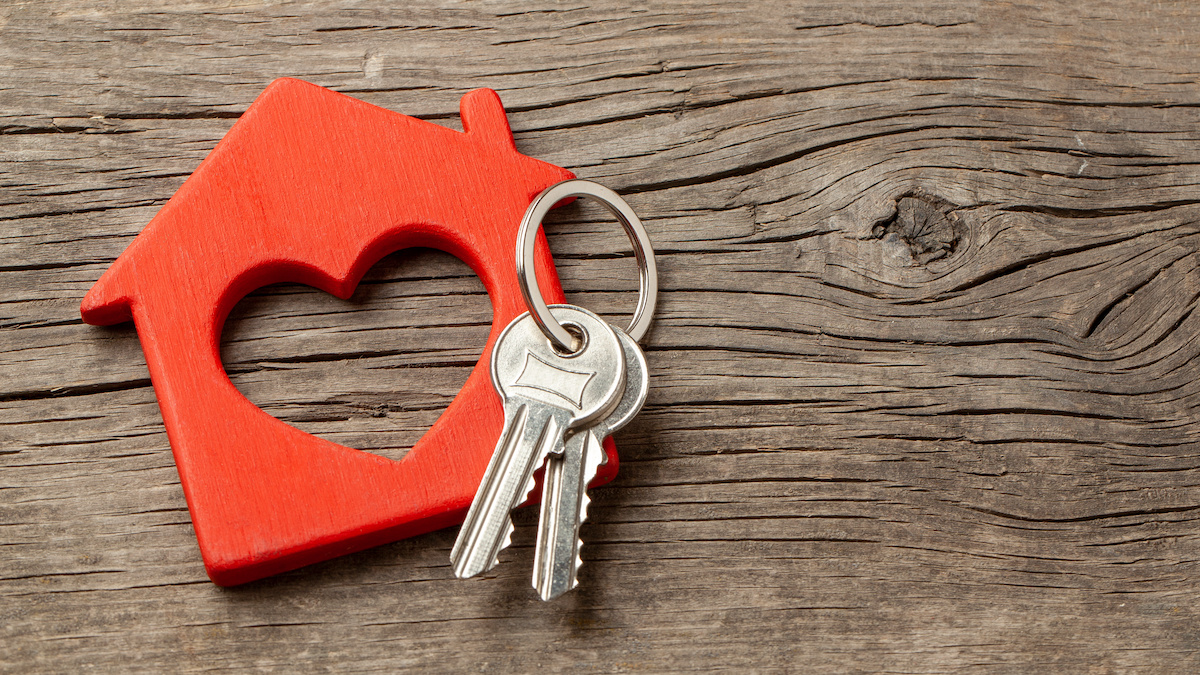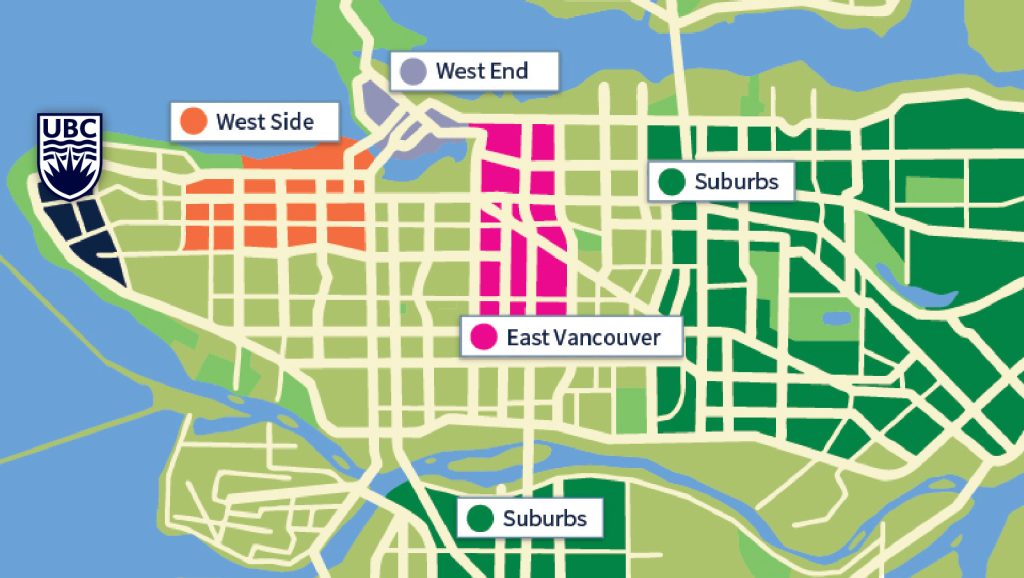
On this page
- Avoid scams, know your rights and find support
- Finding a place
- Short term accommodation
- Key considerations
- Housing styles
- Costs
- After you find a place
- Neighbourhoods guide
Avoid scams, know your rights and find support
Before you begin your search, make sure you know how to avoid scams, what your rights are and where you can find help.
Finding a place
Finding a place to rent in Vancouver can feel like a big challenge, so we’ve put together this guide to help you start your search armed with the knowledge you need to find a great place to live, avoid scams, know your rights and more.
Find a place online
Here are some websites and apps to help you find a place to rent.
These sites/groups are provided as a resource to students. UBC does not endorse them or their rental listings.
- Facebook: UBC Roommates group
- liv.rent
- Global Education City
- Rentsline
- Craigslist
- Off-Campus Housing 101
- Apartment Love
- PadMapper
- Rentseeker.ca
- Sparrow
- RentRadar
Short-term accommodation
A few options for while you search for a place or if you need short-term accommodation between tenancy agreements.
Key considerations
When looking for a place to live, think about what is most important to you. Transit routes, neighbourhood cultures and living costs are important factors when looking for housing.
Transportation
Most UBC students who live off campus take transit, bike or walk every day. UBC is served by numerous bus routes with connections to destinations throughout Metro Vancouver. All full-time students receive a U-Pass that provides unlimited travel on bus, SkyTrain and SeaBus.
- Is where you live walking distance to regular transit? Living far away from the bus stop can add many minutes to your commute.
- Will you need to take more than one bus? Bus transferring adds time to your commute and can be frustrating if you miss a connection.
- How frequent and busy are the buses? Buses close to campus are usually very full and sometimes too full to stop for more passengers.
- Is cheaper rent worth a longer commute? Try picturing yourself after a long, exhausting day.
- Do you mind biking or walking to campus or other places around Vancouver during inclement weather?
- Is it worth more expensive rent to live within minutes of all the amenities?
Noise and neighbourhood dynamic
No one deserves to have an uncomfortable living situation.
- Is your neighbourhood safe?
- Are you okay with noise from other students, young families with children or busy traffic?
- Do you think your new neighbours will be okay with noise coming from your place?
Access to food
Something you will need to think about almost every day.
- Do you prefer cooking or eating out?
- Is there a grocery store within walking distance?
Utilities
Heat, Internet, and cable.
- Can you control your own thermostat?
- Does Internet quality matter to you?
Laundry
How will you wash your clothes and how often?
- Most apartment buildings have shared laundry rooms with coin-operated machines.
- Basement suites and houses may or may not have a washer/dryer.
- Where is the closest laundromat?
Furnished or unfurnished?
- How much furniture will you need?
- How will you get new furniture into the place? Do you need a truck rental?
- Furnished apartments often make sense for students looking for short-term housing.
Bed bugs
Older buildings can often have bed bugs. Check to see if there are bed bugs in your neighbourhood of interest by reviewing the bed bug registry map.
Subletting
If you think you might need to sublet, perhaps while you’re on a co-op term or returning home for the summer, discuss it with your landlord.
Housing styles
There are many housing types to choose from. Read through the differences to see what works best for you.
Basement suites
Also known as garden or ground-level suites.
- Often located in quieter neighbourhoods
- Offer more privacy than apartments
- Generally less expensive than comparable above-ground and garden-level apartments.
- Can provide less natural light sources than alternative housing styles
Apartments
Low-rise buildings (2–5 stories) and high-rise towers (many stories).
- Usually closer to amenities
- Easier to maintain than a house—smaller and no yard work!
- Heat and hot water are often included in the rent
- Beware of older apartment buildings with potential insects (i.e., bed bugs) and mould
Houses
Can be shared among several roommates.
- Is there a yard? If so, who is responsible for upkeep?
- Do you need parking?
- Leasing a full house or separate unit within a house is different than renting a room
Costs
Rents vary greatly depending on apartment location, age and condition. For example, it is generally more expensive to rent in a condominium building than an apartment building, and locations close to UBC are typically more expensive than elsewhere in Greater Vancouver. Keep in mind, these are only general guidelines for cost.
| Housing Type | Rental Average* |
| Bachelor/studio | $1,419 |
| One bedroom | $1,629 |
| Two bedroom | $2,272 |
| Three bedroom | $3,059 |
Rental averages from CMHC Urban Rental Market Survey Data, October 2022.
*Rental average is for an entire unit, not per room or per person.
Additional costs
Additional costs of renting an apartment can include:
- Utilities (e.g., heat, water, electricity)
- Internet
- Cable TV
- Security deposit (one-time cost)
- Pet deposit (one-time cost)
- Apartment furnishings
- Laundry
- Parking
- Renter’s insurance
After you find a place
Inspection
Make sure that you’re getting all you were promised. Before signing a tenancy agreement, inspect the unit (or have someone you trust inspect it for you).
- Do the appliances work? Check inside the fridge and turn on the stove.
- How loud is traffic noise when the windows are open?
- Are there locks on all doors?
- Do the shower and taps work? Turn each one on.
- Do the walls require new paint? If so, ask the landlord to paint before you move in.
- Is the carpet clean? Ask the landlord if the carpet will be cleaned before you move in.
- What does the rent include?
- Will you have to pay extra for heat, electricity, cable, laundry facilities, storage, or parking?
- Is smoking allowed?
- Is the place pet-friendly?
- Can you paint the walls?
- Are you allowed to hang things on the walls?
Water damage (yellow stains on the walls and ceiling), mouse droppings, bed bugs and cockroaches are very bad signs. Avoid renting suites that have these problems. Be sure to alert your landlord to these issues if they come up after you move in.
Deposit and documentation
- Get details of your tenancy agreement—also known as a lease or rental agreement—in writing.
- Take photos to document any existing damage or repairs needed before you move in. If the landlord says something will be repaired or cleaned before you move in, write this down in the agreement.
- Make sure both you and your landlord have a copy of all the agreements you have signed. If you make any changes to the documents, both you and your landlord should initial next to each change.
- Prove that you paid. Pay by cheque or money order, or get a receipt if you pay in cash.
- A tenancy agreement should always outline the terms, conditions and duration of the rental agreement. It is important to review all 3 before signing.
- Tenancy agreements are typically one year or two years. Some short-term tenancy agreements are usually three-month or six-month terms. Typically, when a fixed-term tenancy agreement in BC ends, it gets automatically turned into a month-to-month tenancy agreement that has no end date.
Get renter’s insurance
It’s strongly advised that you carry renter’s insurance to cover your liability for loss or damage to your belongings against theft, fire and other damage.
How do I get renter’s insurance? You may choose to insure your belongings with any private insurance company or BCAA.
Two insurance providers with offices close to UBC:
Set up utilities
Most tenants need to contact BC Hydro to set up electricity and a communications company for TV, phone, and Internet service.
- Electricity—BC Hydro
- TV, Internet, home phone, mobile phone options: Shaw, Telus, Bell, Rogers or Novus.
Furnishings
Most apartments are unfurnished, so you’ll need a bed, desk, sofa, kitchen table, and chairs. Try the following places for good deals:
Online
Off-campus
- Salvation Army Thrift Stores
- Value Village
- Garage and yard sales
Neighbourhoods guide
Neighbourhood cultures, living costs and transit routes are important factors when looking for housing. Explore the neighbourhood descriptions below to see what works for you.
